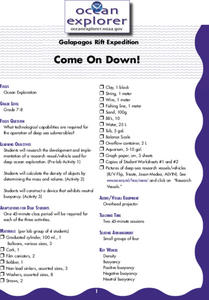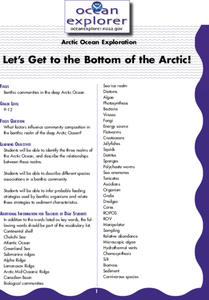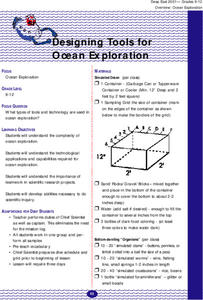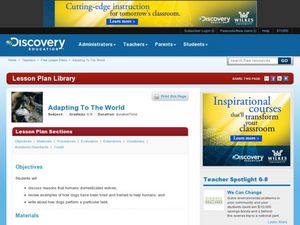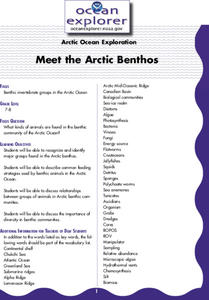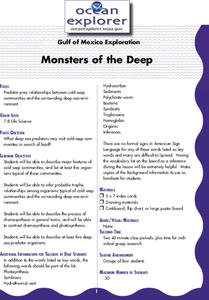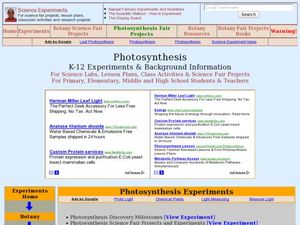Curated OER
Galapagos Rift Expedition Come On Down!
Students research the development and implementation of a research vessel/vehicle used for deep ocean exploration. In this oceanography lesson, students calculate the density of objects by determining the mass and volume.
Curated OER
Health Problems 3
In this health problems worksheet, students write next to each problem if they think it's life threatening or not. Students have 15 health problems to look at.
Curated OER
Hudson Canyon Expedition Let's Bet on Sediments!
Students investigate and analyze the patterns of sedimentation in the Hudson Canyon students observe how heavier particles sink faster than finer particles. They study that submarine landslides (trench slope failure) are
Curated OER
Let's Get to the Bottom of the Arctic!
Students identify the three realms of the Arctic Ocean, and describe the relationships between these realms. They describe different species associations in a benthic community.
Curated OER
All That Glitters...
Students study that white light (visible light) is comprised of all colors of the spectrum. They study that the quantity of light decreases with increasing depth in the ocean. They study that the quality of light changes with increasing...
Curated OER
Spawn!
Students explain that the ability of certain reef fishes to have a successful spawning is dependent on numerous environmental conditions. They list some of the factors needed by reef fishes in the South Atlantic Bight to have a
Curated OER
Designing Tools for Ocean Exploration
Students research the methods and tools used in ocean exploration. They, in groups, simulate an ocean exploration and consider what tools facilitate the exploration's objectives.
Curated OER
Adapting to the World
Students consider dog breeds that are helpful to humans and their hereditary link to wolves. In this biology lesson plan, student research a dog breed for traits that make it useful to humans. Students write a report of how these traits...
Curated OER
Meet the Arctic Benthos
Students recognize and identify major groups found in the Arctic benthos. They describe common feeding strategies used by benthic animals in the Arctic Ocean. They discuss relationships between
Curated OER
Make Sense of Nature
Learners participate in this program that heightens their awareness and curiosity of nature as well as their sense of adventure and exploring new surroundings. They identify and choose an object from nature after exploring it with other...
Curated OER
Writing Myths
Students read and write myths. In this world mythology instructional activity, students read and analyze myths from various cultures and then recognize their attributes as they write their own myths that explain natural phenomena.
Curated OER
Polar Bear Panic!
Students identify the three realms of the Arctic Ocean, and describe the relationships between these realms. They graphically analyze data on sea ice cover in the Arctic Ocean, and recognize a trend in these data.
Curated OER
TE Activity: Sound Line
Students investigate the decibel readings of various noises. They determine why high-level readings damage hearing. Students arrange sound from the lowest to highest decibel levels when they written on a piece of paper.
Curated OER
At the Edge of the Continent
Learners study how to interpret a bathymetric map. They study the main features of the continental margin. They plot and graph bathymetric data. They think about and discuss the bathymetry of the edge of the cont
Curated OER
Taster or Non-Taster?
Students conduct a simple experiment to determine if a trait has been passed from a family member to them.
Curated OER
Sunflower Sundance
First graders study sunflower plants and identify its parts. They plant sunflower seeds and watch them grow and make sunflowers out of paper plates and colored paper. They watch videos and visit websites about sunflowers.
Curated OER
Horns or Antlers-You Decide!
Students study the difference between horns and antlers. They identify animals who have each and draw pictures of these animals. They experience samples of actual horns and antlers.
Curated OER
Journey To the Unkown
Learners explore the ocean rift habitat off the Galapagos through an audio expedition, Internet research on deep sea animals, an explorer game and simulation of the exploration of the deep sea bottom. They focus on the actual NOAA...
Curated OER
Deep Sea Coral Biodiversity
Students research life forms of both tropical coral reefs and deep-sea coral reefs to discover the biodiversity of the ecosystems. They compare and contrast the diversity and adaptations of the two eco-systems, and draw a picture showing...
Curated OER
From the Gulf of Mexico to the Moons of Jupiter
Students compare deep ocean conditions to those found on the moons of Jupiter. In this Earth science lesson, students consider the possibilities and conditions needed to support simple life. Students examine the habitats and life found...
Curated OER
INTRODUCTION TO THE PERIODIC TABLE
Students identify the scientist who first wrote the Periodic Table, identify the scientist who amended the Table, state (or write) specific data relating to the history of the Periodic Table, identify at least five elements, and two...
Curated OER
Breaking Away (Or Not...)
High schoolers compare and contrast common reproductive strategies used by benthic invertebrates. They describe the most common reproductive strategies among benthic invertebrates on a seamount, and explain why these strategi
Curated OER
Monsters of the Deep
Students describe major features of cold seep communities, and list at least five organisms typical of these communities. They infer probable trophic relationships among organisms typical of cold-seep communities.
Curated OER
Photosynthesis
Pupils explore the concept of photosynthesis. They describe the light and light independent reactions of photosynthesis. Students relate physical plant characteristics to their functions. They distinguish between C3, C4, and CAM plants...


